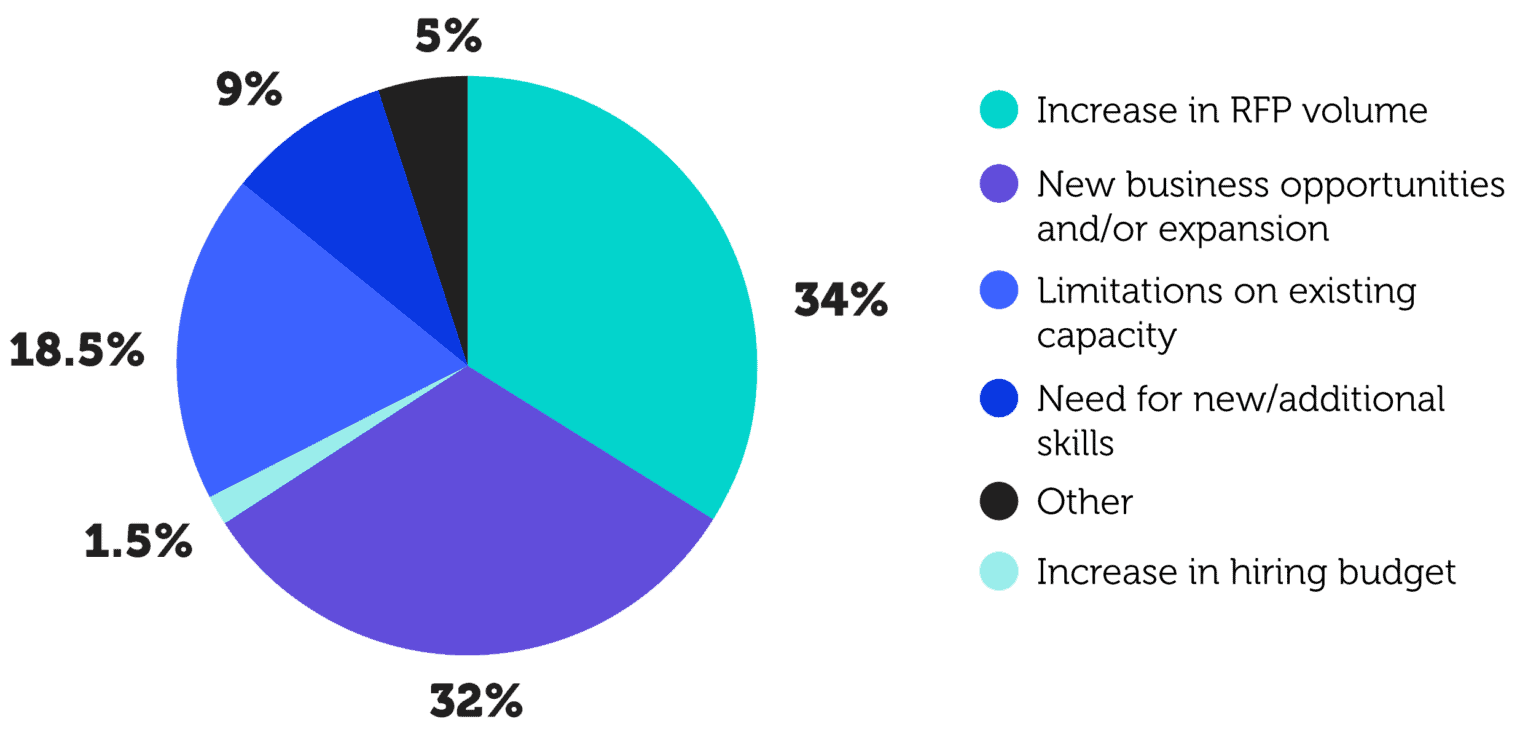Table of Contents
- The Job of a Bid Team
- Typical Roles & Responsibilities
- Why You Need a Proposal Team
- When You Should Start a Bid Team
- Building the Ideal Proposal Team Size
- How to Get Additional RFP Headcount
- More Insights on Careers & Salaries
Rome wasn’t built in a day, and neither are winning proposal teams. If you’re looking to add headcount, you need a well-researched case for the best bid team structure.
When structured effectively, proposal teams add tremendous business value. Besides triaging requests for proposals (RFPs) for huge contracts, strong proposal teams craft compelling narratives, soothe collaboration woes with proposal color team reviews, and even proactively seek new business through capture planning.
Read on to learn how to build an ideal bid team based on research from Loopio’s RFP Trends and Benchmarks Report. Plus, get candid advice from five proposal leaders on how to establish your proposal team roles and responsibilities successfully.
What Does a Bid Team Do?
A bid team is a group of professionals, either within your own organization or subcontractors and agents, who are responsible for assembling a bid or proposal in response to a procurement team’s RFP. This group plays a crucial role in the bidding process, ensuring that the bid is competitive and meets all the necessary requirements to win more business for their organization. 💰 (A bid team can also be called an RFP team or proposal team.)
What is the Typical Team Composition? 6 Proposal Team Roles and Responsibilities
There are many proposal team roles and responsibilities to consider as you scale, depending on the size of your organization and market competition. However, there are six commonly found roles across teams:
Proposal Manager or Proposal Coordinator
The proposal manager or proposal coordinator leads the team and manages the production of high-quality proposal responses, meaning they are directly involved in the writing process. They’d typically serve as your review team leader and are a master of time management, coordination, and triaging among internal experts to ensure resources are appropriately allocated for the best possible proposals. Typically, the proposal manager or proposal coordinator reports into your business development, sales, or marketing teams.

Bid Manager
Contrary to popular belief, a bid manager is different from a proposal manager. Although both jobs handle proposals from the pre-RFP phase to execution, a bid manager (unlike a proposal manager) is not actively involved in writing/editing. Instead, they focus on various activities in the bid lifecycle, like coordinating subject matter experts, organizing meetings with all the key stakeholders, and managing the bid team’s time.
Proposal Writer
The proposal writer is a wordsmith who produces professional proposal narratives that articulate their organization’s value to attract new business. They have a talent for concise storytelling and thorough knowledge of company positioning. (Check out this article to find out: is proposal writing a good career?)
Content Manager
A content manager maintains and builds upon a database of sales and proposal content to improve response quality and team efficiency. In large companies, you may see multiple content managers responsible for maintaining specific business units of product offerings.
Capture Manager
The capture manager owns the end-to-end bid process and manages the sales opportunity. Their job actually starts before the RFP lands since their work focuses on scouting potential deals, qualifying opportunities early, and building strong client relationships to set the stage for a winning pursuit.
Graphic Designer
Finally, graphic designers dedicated to RFPs are responsible for ensuring that the final proposal looks professional and polished. They’ll create and manage media collateral, images, and supporting visuals.
💼 Who Does a Proposal Manager or Bid Manager Report to?
In place of a dedicated proposal department, 63% of RFP teams report into a company’s sales function, but other options work too. Whichever department your proposal team sits under, your goal should be to provide direct support for revenue growth, as responding to an RFP is a crucial stage in the B2B sales cycle.
Grant Waldron shares that his team reports to the Fastly Finance department, which he finds beneficial for focusing on deals with maximum revenue impact.
“It’s a distinct advantage for me to be close to the people who are actually putting together the numbers. I can see what’s really worth going after.”

Why Do You Need a Dedicated Proposal Team? One Good Reason
Answering a tender is a huge undertaking, taking an average of 25 hours to write a single response.
That’s why many companies hire dedicated teams who can truly own and master the response process at their company. As Julie McCoy, Director of Global Proposal Management for DocuSign, explains, “Proposal teams are the experts. We know the industry, competitors, procurement portals, you name it. We deal with RFPs day in and day out.”
Research across 1,500+ RFP teams globally shows that 43% of the time, proposal teams lead an company’s response process. The results? They generate more revenue from RFPs, directly benefiting the bottom line. 💰
Olivia Hartman, Proposals and Growth Operations Leader for Lyra Health, explains there’s a key way that proposal teams support a company’s revenue function.
“The value comes from proposal teams really owning the process and showing up to these RFPs as a strategic partner.”

Tipping Points: When Your Organization Should Start a Bid Team
For employees who don’t handle them regularly, learning how to respond to an RFP can be daunting.
That’s why a dedicated proposal pro typically enters the scene when one of two things happens:
Your organization grows to handle 75+ RFP-related projects per year
Or, your organization reaches 150-200 employees
According to an informal survey conducted by Loopio Labs, the most common factors for creating a proposal team are an increase in RFP volume, closely followed by expanding business opportunities:

The Most Common Factors for Creating a Proposal Team
The top factors for creating a bid team were:
- Increase in RFP volume – 34%.
- New business opportunities and/or expansion – 32%.
- Limitations on existing capacity – 18.5%
- Need for new/additional skills – 9%.
- Increase in hiring budget – 1.5%.
- Other factors – 5%.
However, tipping points do vary from business to business depending on the complexity of the RFPs, requests for information (RFIs), or other sales requests that the team is handling. Data points can also be subjective, so be sure to consider them in the context of your team’s business. For example, more complex government RFPs likely require more support and team effort.
Grant Waldron, Manager of Global Proposal Operations at Fastly, explains, “Sometimes the number of projects is shielded by actually how large the RFPs are. So I actually utilize the volume of questions we’re handling. Looking at the trends across my company, there were only about 10% more RFP projects, but there were 40% more questions overall. So that shielded the big number of how much more work was being taken on.”
Whatever your milestone for hiring an RFP team may be, the next step is determining the right team size to maximize efficiency and win rates.
How to Build a Proposal Team That’s the Right Size
Depending on the size of your organization, you may not need all of these roles at once. A survey among Loopio customers shows the first dedicated role hired tends to be a proposal manager (66% of the time). The next hire tends to be a proposal writer, and that team of two covers the suite of responsibilities across the entire RFP process.
Role Distribution for Small Teams (1-2 People)

Typically, a content manager is hired next, usually at the 1,000+ employee mark or when RFP volume reaches the range of 101 to 150 responses annually.
Role Ratio
According to research from Loopio Labs, an estimated and generalized role ratio for a proposal team is:
- 2 proposal managers
- 4 proposal writers
- 1 content manager
- 1 capture manager
- 1 graphic designer
As the team grows, even more roles and responsibilities may begin to enter the picture. Proposal teams with 10+ members have reported hiring pricing strategists, technical writers, and RFP operations managers.
How to Predict Bid Team Size
Research shows that team size tends to expand proportionally with the size of the company.
For example, small and mid-size companies (<100 to 250) have an average team size of 4 people, while enterprise organizations (5,001+) have an average team size of 14 people. However, the sweet spot appears to be 11 members, as teams of this size typically win half or more of the RFPs they compete in.
Benefits of RFP Software for Growing Teams
Research also shows that teams tend to find efficiencies through bid management software like Loopio as they grow.
Top reported benefits include:
✓ Improved content storage (typically through an RFP answer library)
✓ Automation of manual tasks (like copy-and-pasting answers or formatting documents)
✓ Better quality proposals overall
Beyond bid software, your team may find other specific talents are needed as you grow. Marissa Sproul, a construction industry proposal expert, explains that if a proposal warrants added resources, it’s beneficial to engage someone with specialty expertise.
“Whether it’s a technical writer or salesperson for a specific market… anytime you can bring on pertinent expertise for a proposal pursuit, it’ll only benefit you.”

Will AI Replace the Need for an RFP Team?
As sentiment around using AI in the RFP process becomes more positive, there’s a corresponding increase in interest around replacing staff with this technology, at least a senior level. Seventy-three percent of VPs and 65% of C-level executives are open to the idea of replacing people with AI. Seventy-three percent of VPs and 65% of C-level executives are open to the idea of replacing people with AI.
However, while AI’s efficiency gains are appealing, they can’t replace the value of proposal teams. Winning RFPs requires more than speed—it hinges on inside expertise of the company, a human understanding of client needs, and the instinct to know which opportunities are worth pursuing.
In short, relying solely on AI to manage RFPs without human oversight and expertise poses too great a risk to the bottom line. The need for an RFP team will remain.
“Teams should not be afraid of being replaced by AI—it’s a tool, just like the typewriter was replaced by the word processor. It will create new opportunities as well, such as people with prompt-writing skills. Don’t forget that human beings have creativity and nuances in their communication that AI cannot match.”

🤔 What Makes a Winning Bid Team? The Three ‘P’s:
1. Proactivity: Whether you set up an intake form for incoming RFPs or a go/no-go matrix, a strong foundation ensures your bid team spends time crafting quality responses and meeting deadlines.
2. Planning: Strategic insight is essential—keep a pulse on the competitive landscape and identify key themes in an RFP to help your bid team align to create a tailored proposal. Planning your bid response before writing makes all the difference.
3. Process: The main ingredient to any successful bid team is capacity control. RFP software can help alleviate stress and increase efficiency to get more high-quality RFP responses out the door (without burning out your team).
How to Build a Case for Additional RFP Headcount
When you bring the idea of a proposal team to the attention of decision-makers in your organization, you should be prepared to make a case for it. Generally speaking, you should gather quantitative data to build a business case.
Here are a few RFP statistics to gather before you get started:
- How many RFPs does your company typically respond to each quarter?
- How many hours per week does the sales or marketing team currently spend on proposals? (This may be a ballpark estimate).
- What type of other sales activities could be achieved if that time was freed up? (This may include more discovery calls or demos conducted).
- Lastly, investigate your company’s average win rates and determine how the finding above can be translated into revenue. For example, if your sales reps had time for 50 more discovery calls in a quarter, how does this translate into potential revenue?
Now, use the proof points you gathered to put together your business case. You’ll find when you add up the numbers, there is almost always enough work for a proposal manager salary, and perhaps a proposal writer too. Either way, make sure you bring data that can back up your ask.
“When putting together a business case, numbers really speak to leadership, so I pull that type of language in there.”

As Your RFP Team Grows, So Does Revenue
Recognizing the need to build or expand your RFP team is the first step. When a single person—like a proposal manager—or a stretched-thin team from another department (like sales or finance) is responsible for handling a high volume of bids, opportunities can slip through the cracks. They simply don’t have the time or the T-shaped expertise needed to do the job of an entire proposal team.
But with the right specialists in place, your team can craft proposals that don’t just make the shortlist—they win. And that means more revenue for your company.
